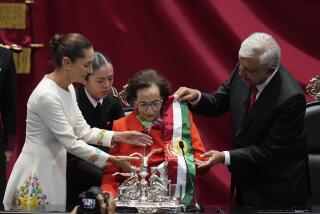Argentine first lady claims presidency amid cheers
- Share via
BUENOS AIRES — First Lady Cristina Fernandez de Kirchner appeared to win a sweeping victory Sunday to become Argentina’s first elected female president, according to exit polls and early official results.
Fernandez, 54, a longtime federal senator and wife of President Nestor Kirchner, was leading her closest rival, former congresswoman Elisa Carrio, by about 20 points, exit polls indicated.
That margin, if confirmed by final official results, would be sufficient to avoid a runoff election next month and allow the center-left Fernandez to take office Dec. 10 for a four-year term.
Fernandez’s apparent election marks an unusual and possibly unprecedented transfer of power between spouses in a democracy.
“We have won amply,” Fernandez said while declaring victory at a celebratory forum at campaign headquarters in a hotel in downtown Buenos Aires.
The election extends the trend of left-leaning elected governments in Latin America, though she, like her husband, is more moderate than Venezuelan President Hugo Chavez and others. But Fernandez is expected to maintain her husband’s friendly relations with Chavez, a staunch critic of the United States who has lavished billions of dollars in aid on Argentina.
The margin of victory, Fernandez said, would possibly be the greatest of any presidential election here since democracy was restored in Argentina almost a quarter-century ago. Most analysts credited her victory to coattails from her husband’s successful economic policies.
“It’s time to reconstruct the social and institutional fabric of all Argentines,” Fernandez told her gleeful supporters, who occasionally broke into chants during her speech about 10 p.m.
Fernandez vowed to reach out to all her compatriots “without rancor, without hatred” and lavished praise on her husband of more than three decades, Kirchner, whom she called “the companero of all my life.” He was seated behind her at the podium with the candidate’s chosen vice president, Julio Cobos, governor of Mendoza province.
Among those on hand to congratulate Fernandez was Segolene Royal, the French Socialist defeated in May by Nicolas Sarkozy in her bid to become the first female president of France.
Fernandez, a mother of two, said she felt a “double responsibility,” as a president-elect and as a woman.
“I want to reach out to all women -- to those who have stayed at home, to the factory workers, to the university students, to the professionals and the businesswomen,” she said. “I know that we can accomplish great work with the special skills that we have.”
Early results here indicated that Kirchner’s ruling Victory Front, which designated Fernandez as its presidential candidate, also was winning big in congressional and gubernatorial races throughout this nation of 40 million.
Argentina is South America’s second-largest country, after Brazil, and third most populous, after Brazil and Colombia.
Fernandez becomes the second woman elected to head a South American government in the last two years, following the election of Chilean President Michelle Bachelet in 2006.
Unlike in Bachelet’s highly contested election, however, Fernandez’s gender was hardly an issue in a low-key campaign that she led from the outset, riding her husband’s popularity.
Opponents here were also hoping to force a runoff, but Fernandez’s large margin of victory appeared to doom that strategy. With more than a quarter of the official vote counted, Fernandez had captured 42%.
Kirchner declined to seek a second term and instead tabbed his wife, a veteran lawmaker and his closest advisor, to run as the standard-bearer of Victory Front, the leading faction in the Peronist movement that has long dominated Argentine politics.
Though Fernandez is often compared to Sen. Hillary Rodham Clinton, she faced no primary and ran largely on the successful economic record of her husband’s administration. One prominent analyst here wrote that the Kirchners had successfully adopted the “Clinton Doctrine,” exemplified in the famous phrase, “It’s the economy, stupid.”
Economic concerns trumped all others and led to Fernandez’s sweeping victory, experts said.
Kirchner, who took office following a profound economic and political crisis, has guided Argentina through four years of robust economic growth that has reduced poverty and unemployment and increased Argentines’ spending power. Retirees have enjoyed bolstered pensions, and government employees have seen steady pay hikes.
“Without doubt the economy has been the central theme in this election,” journalist Joaquin Morales Sola told Canal 13 television. “Argentine society didn’t want to change course in midstream.”
That sense was evident among voters casting ballots Sunday in favor of the ruling party.
“The truth is, we’re all doing better,” said Monica Gomez, 39, a mother of three who voted at a school in provincial La Matanza, a bastion of Kirchner support outside the capital. “My husband has a lot more work than before.”
Fernandez becomes Argentina’s second female head of state. Former President Isabel Peron was elected vice president, not president. The former cabaret dancer ascended to the presidency after her husband, legendary strongman Juan Peron, died in office in 1974. Political violence and economic instability marred Isabel Peron’s tenure, and she was ousted by a coup in 1976.
--
Andres D’Alessandro of The Times’ Buenos Aires Bureau contributed to this report.
More to Read
Sign up for Essential California
The most important California stories and recommendations in your inbox every morning.
You may occasionally receive promotional content from the Los Angeles Times.










